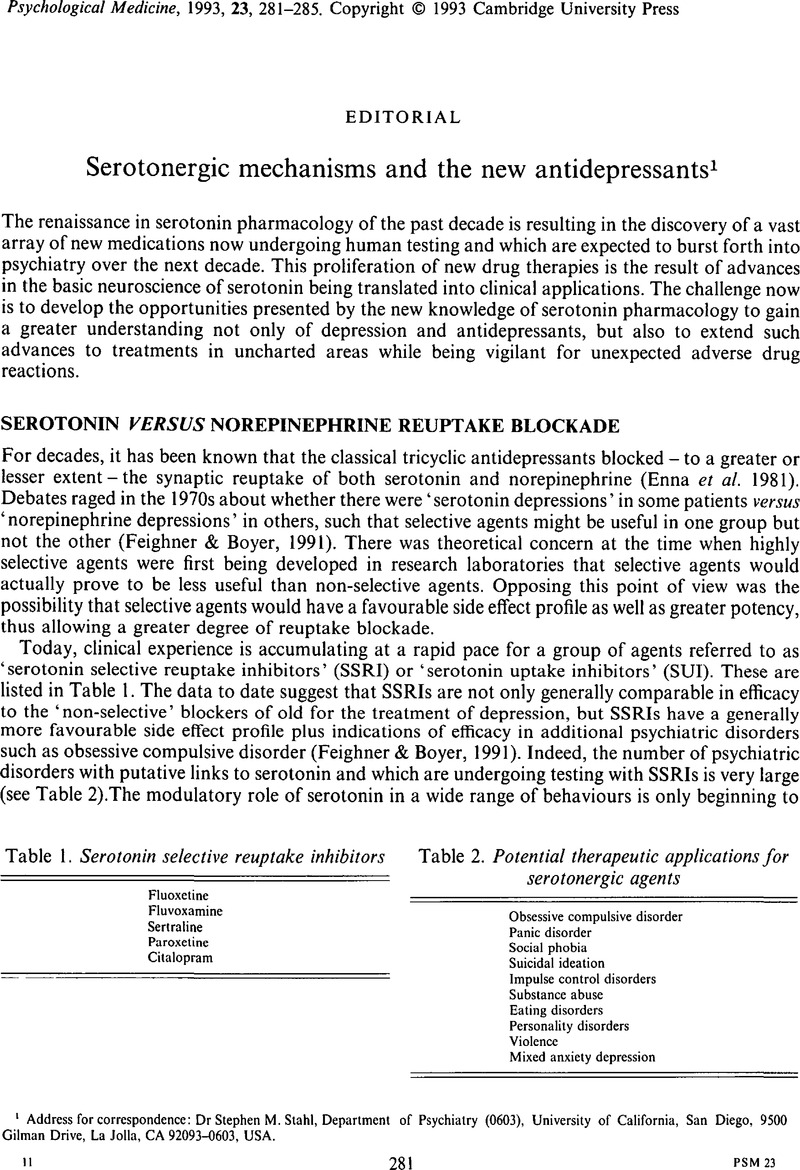Crossref Citations
This article has been cited by the following publications. This list is generated based on data provided by Crossref.
Goldney, Robert D
and
James, Norman McI
1993.
Psychiatry.
Medical Journal of Australia,
Vol. 159,
Issue. 11-12,
p.
780.
Masand, Prakash S.
Reddy, Narayan
and
Gregory, Robert
1994.
SSRI‐induced sexual dysfunction successfully treated with amantadine.
Depression,
Vol. 2,
Issue. 6,
p.
319.
Claghorn, James L.
and
Lesem, Michael D.
1995.
A double-blind placebo-controlled study of Org 3770 in depressed outpatients.
Journal of Affective Disorders,
Vol. 34,
Issue. 3,
p.
165.
Currie, Alan
Ryman, Ann
and
McAllister‐Williams, R. Hamish
1995.
Exacerbation of migraine with paroxetine: Case report.
Human Psychopharmacology: Clinical and Experimental,
Vol. 10,
Issue. 4,
p.
349.
1995.
Clinical Neuropsychology.
p.
381.
De Boer, Th.
Ruigt, G. S. F.
and
Berendsen, H. H. G.
1995.
The α2-selective adrenoceptor antagonist org 3770 (mirtazapine, Remeron®) enhances noradrenergic and serotonergic transmission.
Human Psychopharmacology: Clinical and Experimental,
Vol. 10,
Issue. S2,
p.
S107.
Skop, Brian P.
and
Brown, Thomas M.
1996.
Potential Vascular and Bleeding Complications of Treatment With Selective Serotonin Reuptake Inhibitors.
Psychosomatics,
Vol. 37,
Issue. 1,
p.
12.
Siuciak, Judith A
Lewis, Dacie R
Wiegand, Stanley J
and
Lindsay, Ronald M
1997.
Antidepressant-Like Effect of Brain-derived Neurotrophic Factor (BDNF).
Pharmacology Biochemistry and Behavior,
Vol. 56,
Issue. 1,
p.
131.
Balcells-Olivero, Mercedes
Cousins, Michael S.
and
Seiden, Lewis S.
1998.
Holtzman and Harlan Sprague-Dawley Rats: Differences in DRL 72-Sec Performance and 8-Hydroxy-Di-Propylamino Tetralin-Induced Hypothermia.
The Journal of Pharmacology and Experimental Therapeutics,
Vol. 286,
Issue. 2,
p.
742.
Biri, H.
Isen, K.
Sinik, Z.
Onaran, M.
Küpeli, B.
and
Bozkirli, I.
1998.
Sertraline in the treatment of premature ejaculation: A double-blind placebo controlled study.
International Urology and Nephrology,
Vol. 30,
Issue. 5,
p.
611.
Jolly, David C
Richards, Jerry B
and
Seiden, Lewis S
1999.
Serotonergic mediation of DRL 72s behavior: receptor subtype involvement in a behavioral screen for antidepressant drugs.
Biological Psychiatry,
Vol. 45,
Issue. 9,
p.
1151.
Glatt, Charles E
and
Freimer, Nelson B
2002.
Association analysis of candidate genes for neuropsychiatric disease: the perpetual campaign.
Trends in Genetics,
Vol. 18,
Issue. 6,
p.
307.
Ingram, Michael
Maguire, Gerald
and
Stahl, Stephen M.
2021.
Advances in Depression Management.
Advances in Psychiatry and Behavioral Health,
Vol. 1,
Issue. 1,
p.
185.



